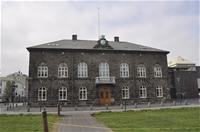The precedent of Iceland or whose sins are the banks' ones
Adelina Marini, April 16, 2011
 Lately I come more and more often across the conflict - if the banks are guilty for the crisis and are left to fail, how does this relieve my situation? Or - if the government decides to support banks in order to prevent them from bankruptcy (i.e. many depositors to loose their savings, mortgages or investments), does this make them automatically accomplices? And when voters in a country refuse to support compensations of foreign citizens who benefited from the failed banks, does this make them irresponsible voters?
Lately I come more and more often across the conflict - if the banks are guilty for the crisis and are left to fail, how does this relieve my situation? Or - if the government decides to support banks in order to prevent them from bankruptcy (i.e. many depositors to loose their savings, mortgages or investments), does this make them automatically accomplices? And when voters in a country refuse to support compensations of foreign citizens who benefited from the failed banks, does this make them irresponsible voters?
What have the Icelanders proved at the referendum on April 9th?
This is the question which will probably be a subject of many analyses not just in terms of a case but as a result that goes beyond the borders of a country. Before the Crisis, financial freedom was blooming. Practically everyone could take a credit for whatever they wanted, and analysts hailed this as economic growth and good economic perspectives. Everything was measured in numbers, ratings, percentages. Iceland is a small country, only some 300,000 inhabitants. It is evident that therefore the economy should be open in order to generate prosperity. Moreover, Reykjavik aimed at becoming a financial hub.
As a result a majority of banks worked practically as pyramids, offering higher interest rates than the usual. Thus some 400,000 citizens of Britain and the Netherlands were tempted to invest in the local offices of Icesave and Landsbanki. Precisely for the conviction that size does not matter, Iceland was the first country, which after the eruption of the global financial crisis, was on the verge of defaulting. By the way, it is not some very specific decision of the government not to save the  failing banks. Simply the banking sector proved to be several times bigger than the country's GDP and even if it wanted, the government had no way to help with public money.
failing banks. Simply the banking sector proved to be several times bigger than the country's GDP and even if it wanted, the government had no way to help with public money.
This is why a deal was reached - the Netherlands and Britain pay compensations to their citizens who had deposits in the failed Icelandic banks and Iceland committed to return the money for a certain period of time. However, issues of this scale are being decided not only by the government or parliament (Althingi) but also by the citizens via a referendum.
In the first referendum in March 2010 the deal was rejected. After a year of negotiations that ended in the end of last year, the government proposed to Althingi a second deal with much better conditions, approved by a majority of MPs and again rejected by the voters. Of course, a lot can be discussed on the issue how well informed the Icelanders were on the parameters of the deal, whether they were interested in it or they had just reacted against their common situation, or whether they see the connection between greedy banks, themselves, globalisation and the government. It is a fact though, that two countries made certain commitments towards their citizens with budgetary money, without being sure that this money would be recovered.
In the other cases, when several states nationalised their banks and poured money to save them, the situation seemed easy - simply the state would recover its investment without a risk. The case of Iceland, however, is very much different.
The second deal
 By the way the parameters of the second deal, approved by Althingi in February, are easy to find. euinside got a resume of the deal after a request to Icelandic authorities. According to the deal, the Icelandic taxpayers commit themselves to pay only the interest on the lost deposits and the deposits themselves are to be paid by selling off the estate of the two failed banks Icesave and Landsbanki. It concerns the interests that are to be accumulated by 2016 and not about those before October 2009.
By the way the parameters of the second deal, approved by Althingi in February, are easy to find. euinside got a resume of the deal after a request to Icelandic authorities. According to the deal, the Icelandic taxpayers commit themselves to pay only the interest on the lost deposits and the deposits themselves are to be paid by selling off the estate of the two failed banks Icesave and Landsbanki. It concerns the interests that are to be accumulated by 2016 and not about those before October 2009.
The interest rate is fixed until mid-2016 as for the Dutch portion of the loan it is 3.0% and for the British portion - 3.3 per cent. The average interest rate is approximately 3.2%. Accrued interest rates on the lost deposits for 2009 and 2010 must be paid in the beginning of 2011 and then since the beginning of 2011 the interest rate will be accrued until mid-2016.
The second deal takes into account the macroeconomic conditions as well, on the basis of which the agreement will function. A ceiling is planned on annual payments by the state after 2016 of 5% of Treasury revenue of the preceding year. Should the amount equivalent to this proportion of the state's revenue prove to be lower than 1.3% of GDP, the maximum repayment shall be based on this percentage of GDP. And another interesting element of the deal: if the outstanding payment is equal to 45bn ISK, it should be paid at once in a 12-months time, which means no later than mid-2016 and the first half of 2017.
The total amount which Iceland has to pay under the deal is approximately $5bn but it varies depending on the exchange rate of the Icelandic crone which has already stabilised. Icesave's share is much larger than that of Landsbanki.
The precedent
The case of Iceland is indeed a unique one. Although the government in  Reykjavik hopes to succeed with a new agreement with Britain and the Netherlands, the two countries have already threatened that they would take the country to court in the European Free Trade Area (EFTA). The trial will take around 2 years and the price Icelandic taxpayers will have to pay, without having anymore the option to appeal at a referendum, will be much higher.
Reykjavik hopes to succeed with a new agreement with Britain and the Netherlands, the two countries have already threatened that they would take the country to court in the European Free Trade Area (EFTA). The trial will take around 2 years and the price Icelandic taxpayers will have to pay, without having anymore the option to appeal at a referendum, will be much higher.
However, this does not replace the main question - who after all is to blame for the situation. From the report of the special commission in the United States, which was tasked to investigate the reasons for the financial crisis, it becomes clear that most of all the governments are to be blamed, together with the regulators and the financial institutions themselves who had not managed to foresee and react to the risk of the excessive expansion of the financial sector. The case of Iceland is very much similar to that of the United States, although the scale is incomparable. Reykjavik created immediately a special investigative committee too, which came up with a report, pointing out the main culprits - financial managers. Several trials were brought up. It is a fact, however, that no matter the outcome of the trials, the money of the depositors will not be reimbursed by the culprits.